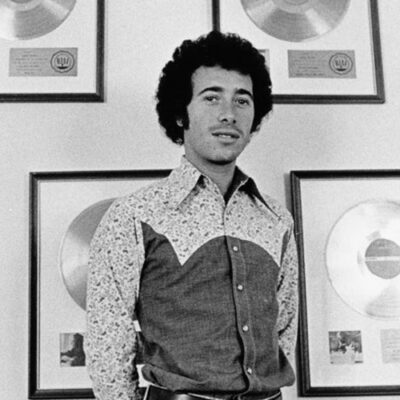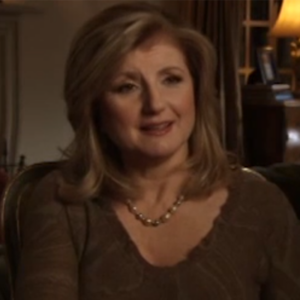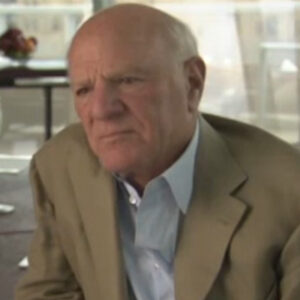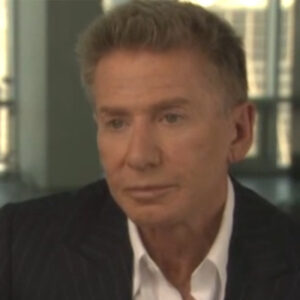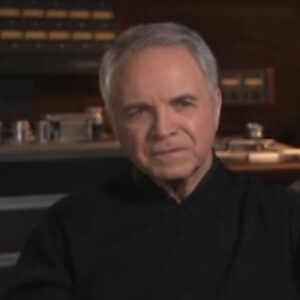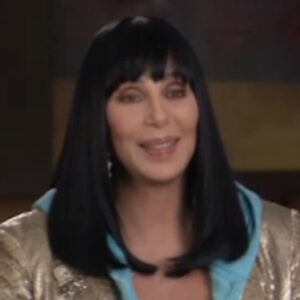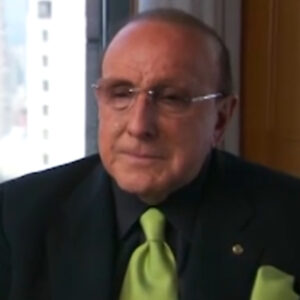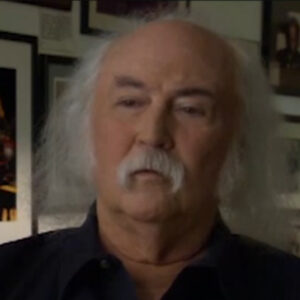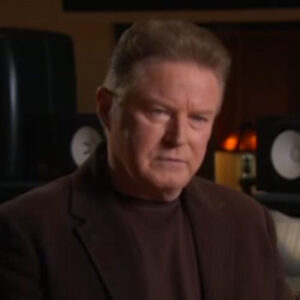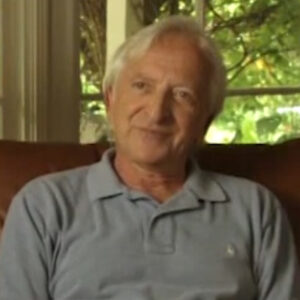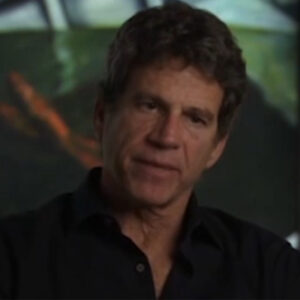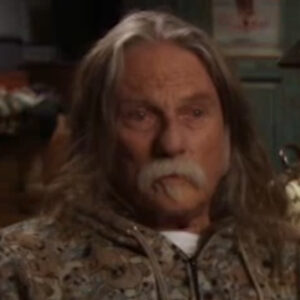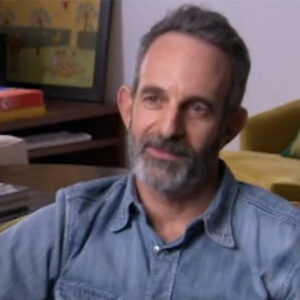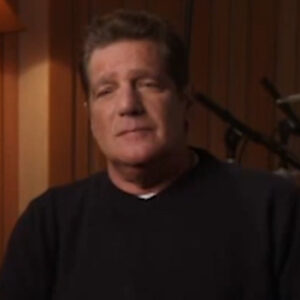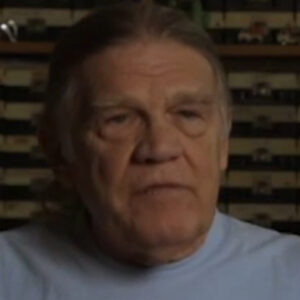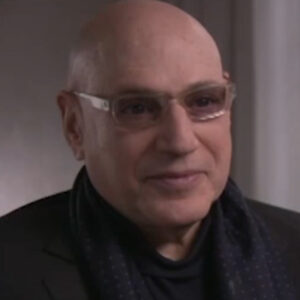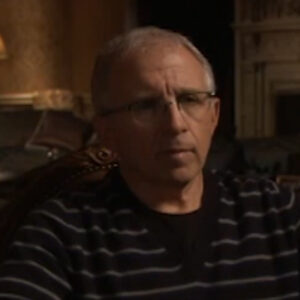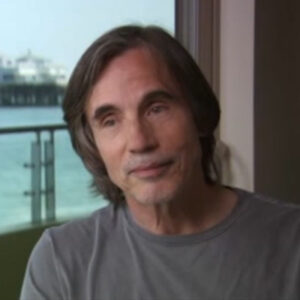Speaker Well, I think I don’t think of David as a friend to women as opposed to a friend to men. I think he’s a friend and he doesn’t have any problem with being friends with very strong, interesting men or women. It’s it’s to him. Part of what the deliciousness is that goes with getting to be him is that you can be friends with. People that you want to be friends with. Who doesn’t want to be friends with Mike Nichols. And and he savors the friendships, he’s so good at them, he’s, you know, he’s one of the last people who understands that a good phone call is a great thing. You know that it’s he has not moved on to. Oh, I use only email and. So he’s and he’s very intimate without being. He’s intimate without being intimately. He’s a person, you know, that you could talk to about almost anything. But you don’t. You talk about sort of what’s happening and what do you think of Obama. And when you think of this and what do you think of that? And are you going to buy The New York Times? And what about the newspaper business and all of that stuff? But it’s not. It’s not. I don’t you know, I don’t have personal conversations with David. But if the day I need to, he’s going to be the first person I call.
Speaker That’s very interesting. But why? Why would you why would you not now?
Speaker You said, oh, because there’s nothing. Do you know? Fortunately, there’s nothing I need to talk to him about. If you know what I mean. I mean, there’s nothing sort of going wrong or or anything. And unfortunately, I. I don’t use him for the financial advice that I should have. About a year ago when he told everyone, including me, to sell everything. But I was too busy.
Speaker So, Mike, we had lunch with Mike after we had lunch with you a couple days later, just down the street. He said that David has saved him financially. And he told me to do certain things. And they did. And he did not say casually.
Speaker Yes. Yes, Erkel. Yeah.
Speaker I think that people who listen to David. You know, did a lot better than those who didn’t listen to him.
Speaker But there are people I mean, he tells a story that his mother was always very surprised at his success and asked him once when he was just beginning. What does a manager do? And he said, well, manager advises people on their careers. And she was like, you do this. You know, she could sort of believe it. But what is that capacity that he has talked about at lunch that he has this extraordinary acumen? Well, thank you.
Speaker You know, here, I’m sure 10 people have told you this story. But David tells this great story about Ahmet Ertegun that I actually think is a story about David, that he asked Ahmet for advice. And Ahmet said to him, and David tells this way better than I do. But and Ahmed said to him, bump into a genius. And I think that that is what David has done over and over and over again and and not bumped into them because that makes it too casual. It’s knowing when you see Joni Mitchell that this is it. When you see Crosby, Nash, Stills and Young, that’s that you’ve found something. And and. Knowing that you can take this. Raw material and make it accessible to. All the people whom you believe should who you believe should be seeing it. I mean, he he was so committed to the artists that he loved. And, you know, when you hear him talk about Laura Nyro, it’s still one of the greatest things he was ever part of. And, of course. I don’t know what she would have been without him. It it’s this thing where, yes, she’s a genius and we know that. But we know it partly because David knew it and made us see it and knew what they should be recording and what they should be doing and how to distribute it and all those things that are sort of somewhat business things, but not all. I mean, not so much of it is just wanting to take what you believe in someone’s ability and and make everybody know it. And that that to me, is what David has done over and over and over again in his life.
Speaker That’s terrific. So did he ever talk?
Speaker I mean, I’m sure he did, but because Laura is not here to talk about it and to me, that was his first his first artist and he was so tense about it. He ever talk? And then, of course, it ended badly and she hurt him very much. Did he ever talk about that?
Speaker He talks about her all the time. Well, not all the time. I mean, I ask about this. Yes, and he talks about how painful it was, but he what he really likes to talk about is how much he loved her, how much he thought she was just one of the great performers ever. So so that I think I think he had ups and downs with many of the people he managed. And yet when he talks about them, what he really talks about is how great they are or were.
Speaker That’s wonderful. You know, Clive yesterday was saying, well, he didn’t say yesterday as well as he did. I predicted that we’re going to go back. He said that day, that’s. David didn’t have a partly because I think he was the same age as they were all a group.
Speaker They were all young, scrappy kids, changing business, changing the music business. And David was saw that it was the force. They didn’t have boundaries. It wasn’t like I’m the manager and you’re the artist. And I go home at night and I will talk to you till the next morning.
Speaker It’s classic than my artists have moved in with me and that inevitably that I would think it would be clear that that kind of intense connection where you don’t have those boundaries you’re going to have when you have the ups and downs are going to be like having with your family.
Speaker Yes, I suppose that’s true. I wasn’t there for that. I just wasn’t he. He was a legend at the age of whatever. He was a young legend, but I was not in that world. So I don’t really know about. How did you get to be friends? Well, we always are trying to figure that out. We knew each other. We knew each other as one. And we met actually at the opening of Silkwood. And I was instantly crazy about him. But we didn’t really become friends until about six years ago. I think when I was in California doing a movie and we just fell into a friendship. And it’s hard for me and I know this is true with other people who are good friends of David’s. Later in his life, it’s hard for me to imagine that we haven’t always been close friends. So me, he does that he he’s just ready to commit to a friendship when he wants to.
Speaker And why did you predict that she answered that? Talk about. I am interested in his movie career. And he must be as well being in the movie business. He didn’t do well initially in it because he’s such a maverick and he doesn’t really like to have group decisions. Do you have any any comment on that? I’ve heard him talk to you about when he was at Warner and how that what that meant for him.
Speaker Well, I don’t think he doesn’t talk about. I think what he he will tell the story of personal best stem, what a nightmare it was. And he’s such a great storyteller. That it becomes it’s not it’s not a story of here’s what here’s what it was like in the movie business. For me, it’s a story of what it was like making personal best. And the truth is that one of the hardest things in the world is to make a good movie. So. So when you hear those stories, you don’t think, oh, this is a story about David and the movie business. You just think this is a story about the movie business. And it’s quite a good one, actually. And so, you know, but I’ve never had a real conversation with him about. About that, I mean, I just think I think David. And I’m very sympathetic to this because I really do my my own weakness in this area is that I really do know what people should order in a restaurant or how it should be cooked. And David has that. And but about much bigger things than I do. And and I think it is I think having having been so right about. The musical, the musicians that he was involved with. You go into the movie business and God help you, God help you if you think there is anything resembling control in the movies, even if you’re the director. It’s it’s just a mad collaboration that you hope is going to work out. And I think many of the stories David tells are from that realization. I don’t know if he had it at the time because, you know, everybody can see a movie and say, oh, if you just do X and Y, it’s going to work. But the truth is, you can do X and Y and it still might not work.
Speaker But he was pretty much bought out. I mean, his instincts were at the of Risky Business, which I’m not going to ask you to tell because I don’t know. Yeah. He you know, he was very involved. And he he felt at the air tankers needed to get into college and they and the director said, no, he would work at a college so people could be really disappointed. And so they did. They tested two endings. And he was right about his hated the ending. We didn’t get these if they need that reward. So he kind of got that has a very interesting sensibility. If you look at the movies that he’d been involved with, defending your life, the Vampire and Butterfly, which I think that was actually on Broadway, there’s this I don’t know whether there’s any kind of connection, but some of them work on the surface. Instantly commercial projects.
Speaker Well, you can’t pin David’s tastes down. He’s very he he’s open to all sorts of things. And he doesn’t have a kind of oh, he only does this or he often does that. But most of the time when he’s doing something underneath it, there’s some there’s somebody he believes in. At the core of it. And but but, you know, the the other thing the other thing that is a whole other area here is you look at his paintings. You look at. Everything in his. Houses. And obviously, somebody occasionally brings him of an auction thing and says, what about this? But the truth is, David has amazing taste. He is amazing. His. And it’s completely it’s completely natural. It’s to me, it doesn’t seem. I mean, once we were in Barcelona and went to see the Gouty Cathedral and he had never seen it or else he had seen it. I can’t remember if he’d seen it or if he hadn’t seen it. The point is, I saw it all over again through him just the way he talked about me. He was so excited by it, as anyone is when you see that amazing thing. And and I had such a sense of him as as an appreciator of art, as as opposed to a collector, which he also is. It it was thrilling to see how he just. Saw it, saw the light, saw the shape. Saw what? What it was. And the narrative of it and everything. So, you know, that is that is an immense gift that doesn’t come from having taken art history classes or or anything. He just he’s just got a great eye and obviously has a great ear and. That’s one of the reasons why.
Speaker David Geffen and we’re not I’m sorry, I’ll have to do that again with Debbie. Oh, OK. That’s one of them. Oh, never do it. Well, try. That’s one of the reasons. And that’s one of the reasons why he’s David Geffen. And we’re not. I think we all like to be. I do. Fine.
Speaker I mean, I’ve been in his house and, you know, it’s an extraordinary experience. It’s like being a museum.
Speaker And then you look it’s background and where it came from. And. That’s the biggest leap you could possibly imagine.
Speaker And it’s like being in a museum, but it’s not really because it’s very comfortable.
Speaker That was amazing private art collection I’ve ever seen. It’s pretty great. Yeah, yeah. But that’s a huge leap coming from where he came from to that. And I don’t mean just because he got unbelievably rich that he did.
Speaker This reminds me, I have a really cute picture of him in front of the Jackson Pollock. He sold. If you want it, if you could use it, I’ll give it to because it’s I took it as a sort of worst moment of his having that painting. But anyway, go ahead.
Speaker Well, he obviously has a fierce intelligence. And, you know, he he stood out from you know, he was a I think, and an isolated child. I can’t go into that. But I think he always knew. I mean, the brashness of his own self-confidence is kind of one of these extraordinary things for me. And I think it’s one of the reasons he got so far. I mean, he’s he just he never for one second seems to have doubted that he was going to be successful. And he has a talk about his intelligence. I guess so I’m trying to get out. I mean, it’s not just that he was lucky. You know, you don’t just decide, oh, I think I’m going to invest in art and become as knowledgeable as that. You could rely on people who were just telling you, buy this because you’re going to make a good investment in it. There’s something else. And he’s as an appreciator.
Speaker Well, I don’t know any more than I just said to you. I, I believe that he actually, you know. David is like a reporter in that he. He doesn’t he doesn’t buy things only because he likes them. He does. I mean, he does call, he finds out what’s on the market. He finds out if it’s good. He finds out what it’s worth. He doesn’t overpay. There’s an enormous amount of work that goes into. Putting those that collection together, that is not merely about I love that painting.
Speaker You didn’t know David when he was diagnosed with cancer? No. And then turned out to be false. But I think that set him on a path of some kind of spiritual search. And self actualization. I mean, I think that’s all documented. He talks about it, tried all kinds of things, went into therapy. Debt is heavy, as you ever talked to you, about how those things.
Speaker What kind of person he is today versus what kind of person he was that you ever talk about transformation?
Speaker Yes. I think all of us at a certain point talk about transformation. And one of one of the things no one knows is whether one wouldn’t have made the transformation simply from getting older and a little bit wiser. But there is no question that that that was a stunning moment for him. And I remember once being it Sue Mengers house. Thirty years ago, I don’t remember. So long ago, and she had the most beautiful painting on the wall. And I said, what is that? I have no idea what it was. By the way, because I’m really the wrong person to ask these things of. But she said David gave that to me when he thought he was dying and he gave everything away.
Speaker And then, of course, it turned out. It was.
Speaker Not true, and he didn’t ask for any of it back, which I. Or in fact, I think the opposite was true. He told everyone they didn’t have to give it back. But that thing he did of of the sense I have, which is that when he got that diagnosis, he handled it in a kind of amazing way in terms of talking to people about it and saying, I want you to have this or I want you to have that. That has that memory has almost been more impressive to me than anything else about it. And then he found that it wasn’t true. And it was like, OK, next I will do the next thing. I’ll start all over again and have another hugely successful life.
Speaker But she did records with the more successful asylum. It was a different, different kind of artist. He was less personally involved at that point. The much more interesting period, I think, is the 70s. So tell us about being on the boat.
Speaker The boat David bought a great toy, or at least he bought half of a great toy, he probably has the world’s most expensive timeshare. He bought a boat that was already built by Larry Ellison. And and speaking of bumping into a genius, Larry Ellison is a genius. And this boat, I, I, of course, cannot judge Oracle software, but I suspect that this boat is at least as good as any Oracle software that Larry Ellison ever had a part in, because it’s it’s a beautiful, beautiful, simple, huge boat. And every single thing about it is pleasant. Without being without being distracting, I don’t know how to say it. And David loves it. David David is like the Flying Dutchman on it. He could just sail around the world almost forever and be completely happy as could. By the way, almost any of us on this boat.
Speaker He seems to have some kind of special connection.
Speaker He never gets off it. You know, we have to drag him off to see the Goudey Cathedral. He he we have to drag him off for the greatest pastor in all of all of southern Italy. But he does go. But oh, my God. The struggle. Why? He’s just really happy on that boat.
Speaker Any insight as to why that is so kind of a refugee thing for now?
Speaker Well, I think it’s I think he loves it and I think he’s probably been dragged off to too many things in his life to ever be sure he wants to go to another. But but he just he loves the boat.
Speaker And just tell us. I mean, I’m not trying to invade a personal life, but he may or may not ever invite us onto the boat. I have no idea. He invited me personally. He hasn’t invited me with a film crew yet. But give us an idea of what kind of a collection of people might be on the boat. Oh, I can’t do that, Kenneth.
Speaker He’ll tell you, but. You.
Speaker Just you, you. Oh, you see this great thing about how he got a credible connection with the water, loves the water.
Speaker But I’ll never go on the beach.
Speaker All right. OK, well, I mean, I guess one. I mean, David and my husband, Nick Pileggi, both went to the same high school in Brooklyn and both of them really never learned to swim. David is not a swimmer. He can swim in a pinch. He could swim, but he would really rather not swim. So that rules out one of the main reasons why you would ever get off a boat. And he doesn’t love a beach either. But I. I sympathize with that. There’s way too much sand on a beach for me. So.
Speaker You prefer a swimming pool? Yeah, me too. What did it give us if you’ve got one or two examples of something really funny that Dave? Oh, I don’t know.
Speaker Funny, it’s hard to hard to think of it that way. Did I mention anything at lunch? I don’t want to be like Warren and not tell you the thing I told you.
Speaker Just just because I forgot it. Right? Yeah. What? I don’t remember that. You know, how does something very poignant about you.
Speaker I don’t know. I mean, I don’t think of him. I you know, I just think of him as as great company, great company.
Speaker Just just someone who who who has has the fund gene, which to me is one of the most important things in life. And and, you know, love is a good book. Loves his friends. Loves a great story. Loves telling a great story. Loves whatever new gadget he just bought. He’s, you know, he’s an appreciator. Listen.
Speaker Tell me, because you don’t have to tell it, but what are some of the. He says a great storyteller. What are some of the stories I should ask him about?
Speaker Oh, well, you probably heard that. You know, I love the story of how he started asylum.
Speaker The story about Ahmed and Jackson Browne. I love that story.
Speaker And I love the story of how Bob Dylan totally screwed him in some negotiation, which is a hilarious story, which David is sort of the butt of the joke of, and he loves to tell it.
Speaker What else? I think that actually hurts feelings.
Speaker Well, it probably did. But he still tells it. You know, David has managed to turn some of these defeats into stories he is the hero of because he’s telling the story so well. So I love hearing those stories.
Speaker What else, what else?
Speaker I love hearing about his early years at in the mailroom and how he rose up from that. You know, there those are easy stories to get out of him. But.
Speaker You know, he always says, well, in print, he said lots of times. That was kind of happy. It’s time for him like you would never be able to recreate that period. It was such an unique.
Speaker He was so young and he was just soaking it all up.
Speaker Yeah. And it was all happening. All the dreams were coming true. I mean, I think that I don’t I don’t think there’s any question but that he he grew up hoping. Bet his life would in some way become what it did.
Speaker But does he have. He’s had a lifetime of mentors seeking. Beginning, I think, with I think probably Clive. And then on it and then Steve Ross. Does he have any mentor’s name?
Speaker I don’t know.
Speaker I don’t know.
Speaker I don’t know, I mean, I think he I think he. Meets people whose brains he’s crazy about. But I don’t. I don’t think in answer to your question, that. But I don’t know, he would know.
Speaker How do you think having the kind of money that he has affected besides giving him a great life?
Speaker Well.
Speaker I don’t know. I mean, I think I think he knows that.
Speaker He has all the money he needs.
Speaker That that whatever whatever there was in him once that made him want to have a huge amount of money, I think is now he empirically knows that, that it’s very hard to spend the amount of money he has. And I think he takes so much pleasure in what he gives away. I think he takes so much pleasure in the fact that if if something is wrong with anyone he knows, he will be able to find the right doctor for them because of. Because he has given so much to medicine and it’s it makes.

